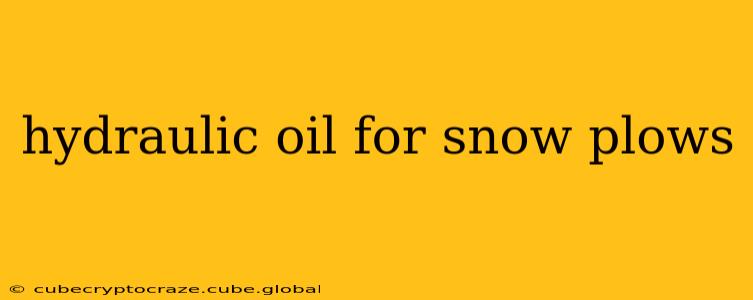Winter's fury demands reliable equipment, and for snow plow owners, that means using the right hydraulic oil. Choosing the wrong oil can lead to costly repairs, downtime, and even safety hazards. This comprehensive guide will help you understand the importance of selecting the correct hydraulic oil for your snow plow and answer some frequently asked questions.
What Kind of Hydraulic Oil Do I Need for My Snow Plow?
This is the most crucial question. The answer isn't a single type of oil, but rather a specification. You need to consult your snow plow's owner's manual. It will specify the exact type and viscosity grade of hydraulic oil recommended by the manufacturer. Ignoring this recommendation could void your warranty and damage your equipment.
The manual will typically list something like "Use ISO VG 46 hydraulic oil" or a similar designation. Let's break this down:
-
ISO VG: This stands for International Organization for Standardization Viscosity Grade. The number (e.g., 46) represents the oil's viscosity, or thickness. Higher numbers indicate thicker oil, suitable for higher temperatures or heavier loads. Lower numbers are for lower temperatures and lighter loads.
-
Specific Brand Recommendations: While the ISO VG number is crucial, your manual might also specify preferred brands. While not always mandatory, using a reputable brand known for quality hydraulic oils can improve performance and longevity.
-
Additives: Many hydraulic oils contain additives to enhance performance, such as anti-wear, anti-foam, and rust inhibitors. Your owner's manual will guide you on necessary additive types.
What Happens if I Use the Wrong Hydraulic Oil in My Snow Plow?
Using the incorrect hydraulic oil can lead to a multitude of problems, including:
- Reduced Efficiency: The wrong viscosity can cause sluggish operation, reduced lifting power, and slower cycle times.
- Increased Wear and Tear: Incorrect oil can lead to increased friction within the hydraulic system, causing premature wear on components like pumps, valves, and cylinders. This results in costly repairs.
- Leaks and Seals Failure: Incompatible oil can damage seals and gaskets, leading to leaks and fluid loss.
- Hydraulic System Failure: In severe cases, using the wrong oil can lead to complete hydraulic system failure, rendering your snow plow unusable.
- Safety Hazards: A malfunctioning hydraulic system can create dangerous situations, especially when operating heavy equipment like a snow plow.
How Often Should I Change the Hydraulic Oil in My Snow Plow?
The frequency of hydraulic oil changes depends on several factors, including the type of oil used, the operating conditions, and the manufacturer's recommendations. Consult your owner's manual for the recommended change interval. However, as a general guideline, it's a good practice to change the oil at least once a year, or after a significant number of operating hours. Always check the oil level and condition regularly and change it sooner if needed. Cloudy, dark, or contaminated oil is a clear sign it needs replacing.
Can I Use Universal Hydraulic Oil in My Snow Plow?
While some "universal" hydraulic oils might seem like a convenient option, it's strongly discouraged. Universal oils often lack the specific performance characteristics needed for demanding applications like snow plowing. Using a universal oil might still lead to the problems mentioned earlier. Always prioritize the manufacturer's recommended oil specifications.
What are the Signs that My Snow Plow Needs a Hydraulic Oil Change?
- Slow or sluggish operation: Noticeably slower lifting, lowering, or angling of the plow blade.
- Unusual noises: Grinding, squealing, or whining sounds from the hydraulic system.
- Leaks: Fluid dripping from the hydraulic lines, pump, or cylinders.
- Dark or cloudy oil: Inspect the oil; if it's significantly darker or cloudier than when fresh, it's time for a change.
- Overheating: If the hydraulic system is consistently overheating, the oil may be failing to adequately lubricate and cool the components.
By following the guidelines in this guide and diligently consulting your snow plow's owner's manual, you'll ensure your equipment operates efficiently and safely throughout the winter season. Remember, preventative maintenance is key to avoiding costly repairs and ensuring your snow plow is ready when you need it most.
